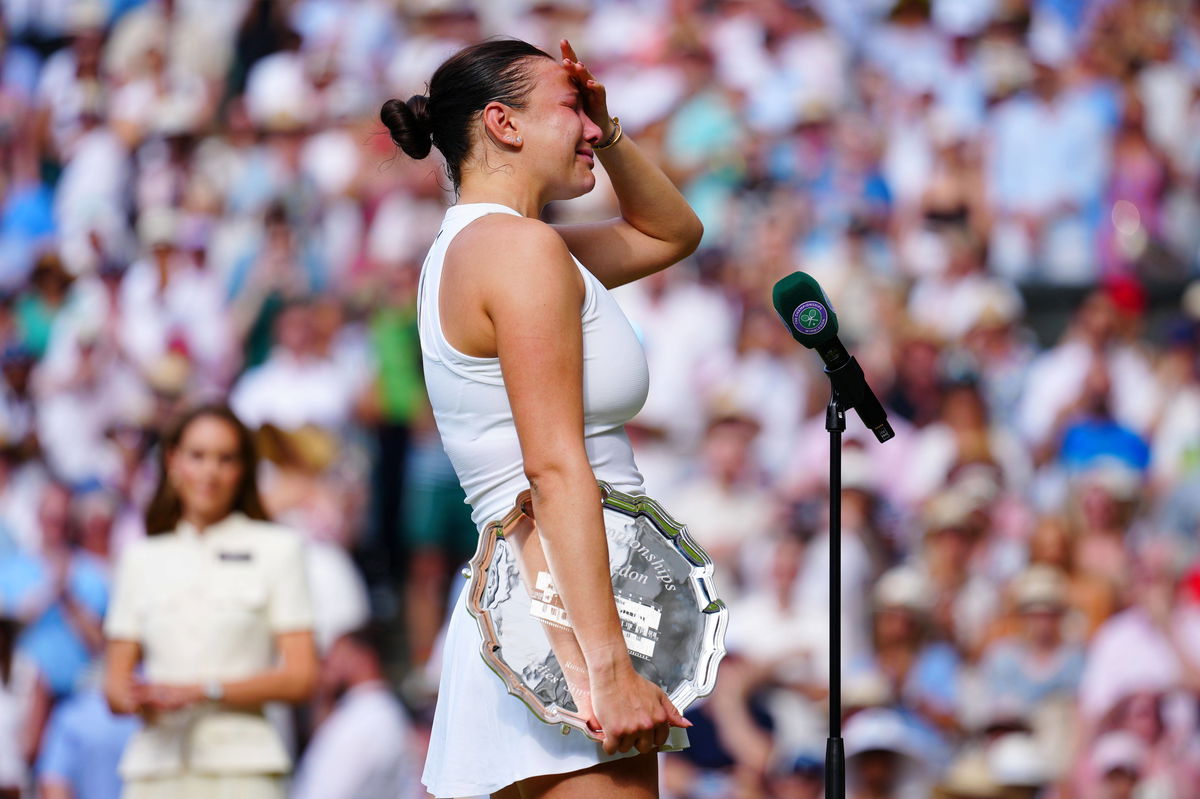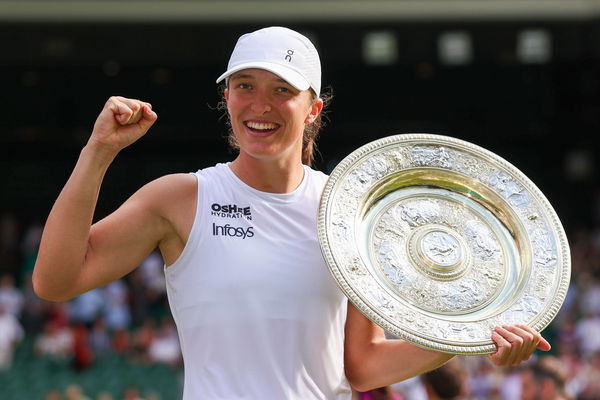
Imago
Amanda Anisimova after defeat in the Ladies Singles Final, watched by Catherine Duchess of Cambridge Wimbledon Tennis Championships, Day 13, The All England Lawn Tennis and Croquet Club, London, UK – 12 Jul 2025London The All England Lawn Tennis and United Kingdom PUBLICATIONxINxGERxSUIxAUTxHUNxGRExMLTxCYPxROUxBULxUAExKSAxCHNxDENxINDxITAxPORxESPxSWExTURxMEXxCOLxVENxPERxECUxBRAxARGxCHIxURUxPARxPANxONLY Copyright: xJavierxGarcia/Shutterstockx 15392293dj

Imago
Amanda Anisimova after defeat in the Ladies Singles Final, watched by Catherine Duchess of Cambridge Wimbledon Tennis Championships, Day 13, The All England Lawn Tennis and Croquet Club, London, UK – 12 Jul 2025London The All England Lawn Tennis and United Kingdom PUBLICATIONxINxGERxSUIxAUTxHUNxGRExMLTxCYPxROUxBULxUAExKSAxCHNxDENxINDxITAxPORxESPxSWExTURxMEXxCOLxVENxPERxECUxBRAxARGxCHIxURUxPARxPANxONLY Copyright: xJavierxGarcia/Shutterstockx 15392293dj
Wimbledon has crowned countless queens. Barbora Krejčíková stunned in 2024, but few expected Iga Swiatek, long branded a clay-court assassin, to conquer the grass. Yet she shattered all doubts, steamrolling Amanda Anisimova with a brutal double bagel, silencing the last American hope of repeating Serena’s legacy. Now, as the grass settles, Swiatek’s trusted psychologist Daria Abramowicz has peeled back the curtain, revealing exactly what crumbled inside Anisimova’s camp on that fateful day.
Watch What’s Trending Now!
No woman had dished out a double bagel in a Wimbledon final since 1911, when Dorothea Lambert Chambers left her opponent scoreless. Over a century later, Swiatek resurrected that icy dominance. And in doing so, she became the youngest woman since Serena Williams in 2002 to clinch Slams on clay, hard, and now, finally, grass. Only the Australian Open remains unconquered, just one jewel missing from what is rapidly becoming a crown of immortality.
But what happened to Amanda Anisimova? What cracked the calm of the last American standing? According to Swiatek’s trusted psychologist, Daria Abramowicz, the breakdown was more mental than mechanical. In a sharp, revealing interview with Wojciech Kruk-Pielesiak, sourced through the Polish Press Agency, Abramowicz was asked if the lopsided scoreline reflected mental collapse as much as performance. She opened by referencing Polish women’s team captain Dawid Celt, who “said very accurately and very briefly that it is difficult to make a very big story for this match, because Amanda Anisimova simply felt the effects of very high stress very strongly and this was undoubtedly one of the main factors that influenced the result.”

Imago
Iga Swiatek celebrates with the Venus Rosewater Dish after victory in the Ladies Singles Final Wimbledon Tennis Championships, Day 13, The All England Lawn Tennis and Croquet Club, London, UK – 12 Jul 2025London The All England Lawn Tennis and United Kingdom PUBLICATIONxINxGERxSUIxAUTxHUNxGRExMLTxCYPxROUxBULxUAExKSAxCHNxDENxINDxITAxPORxESPxSWExTURxMEXxCOLxVENxPERxECUxBRAxARGxCHIxURUxPARxPANxONLY Copyright: xEllaxLing/Shutterstockx 15392295bb
And then she went deeper. “Of course, I don’t know how Amanda and her team work, but it just showed. However, when it comes to Iga, it’s not that she doesn’t experience tension, because she said herself that the stress was very strong. Using her skills, her own potential at such a moment is crucial, and I couldn’t be more proud of how she is able to do it.”
Swiatek’s command was visible from the opening ball. In just 25 minutes, she tore through the first set, giving Anisimova no air to breathe. Despite being just three months apart in age, the Pole looked years ahead in composure and experience. The American crumbled under the lights, rattled nerves led to a flurry of unforced errors, and she barely won nine points in the opener.
Even as a sympathetic Centre Court crowd rallied behind her, Anisimova couldn’t stop the bleeding. In the second set, the errors stacked up: 28 unforced ones, five double faults. The tears welled up as she addressed the crowd afterward, trying to steady her voice: “It’s been an incredible fortnight for me—even though I ran out of gas. I wish I could have put on a better performance for you today.”
And this isn’t even the first time Abramowicz revealed the truth behind the curtain. Not long ago, she admitted just how afraid Swiatek was before the match began. But the fear didn’t stop her, it sharpened her. And that’s what separates champions from the rest.
Iga Swiatek’s psychologist opens up on Wimbledon journey
Iga Swiatek’s road to Wimbledon glory wasn’t paved in gold; it was carved through grit, growing pains, and a relentless pursuit of evolution. The first half of the season had tested her resolve. Despite steady results and deep runs, her losses painted a picture of a champion fraying at the mental edges. Her confidence wavered, her aura dimmed. But when the grass season arrived, something shifted. And now, with the Venus Rosewater Dish in hand, the mastermind behind her mental resurgence, psychologist Daria Abramowicz, has revealed the silent work that forged Swiatek’s rebirth.
In a revealing interview with Polskie Radio 24, Abramowicz laid it bare. “Iga had to grow up to it, because she was afraid of this grass,” she confessed. “But this year it turned out that when Iga went to train in Mallorca after a clay court season, she went to Bad Homburg, we saw a completely different girl.” What once triggered nerves now inspired courage.
But beyond the stats, beyond the trophies, Abramowicz spotlighted something even more vital: joy. “The joy and satisfaction of the competition itself is very important, if not the most important,” she said. “The joy of developing as an athlete, as a tennis player, but also as an athlete… I try to pay attention to it, because it is a system of connected vessels to be able to correct some beliefs.” For Swiatek, it wasn’t just about dominance; it was about rediscovering love for the game.
In London, Swiatek looked invincible, but her composure was the true breakthrough. The storm of inconsistency that had haunted her earlier in the year has passed. With only a handful of points to defend in the season’s second half, including at the US Open and Riyadh, her climb back to the top is no longer a dream. It’s a looming possibility.
And as the final Slam of the year approaches, one question takes center stage: Will Iga Swiatek conquer New York once again and leave no doubt that she’s the queen in a WTA world of shifting sands?

